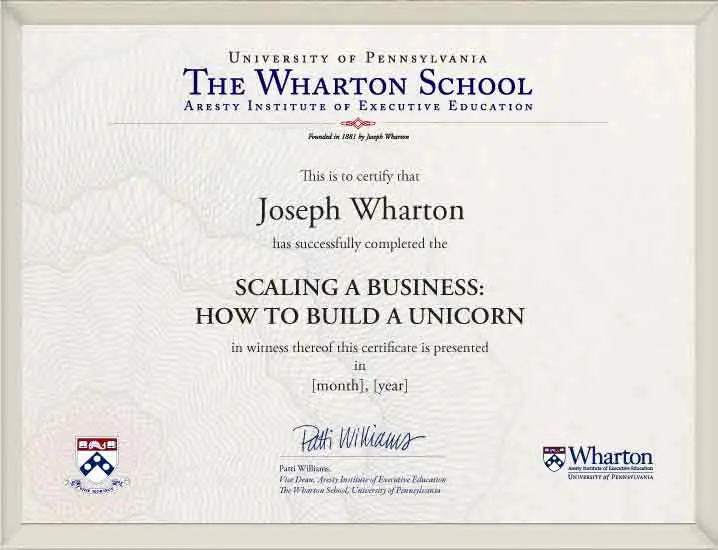Scaling a Business: How to Build a Unicorn
Play a vital role in executing the growth strategy for your business
Key Takeaways
Wharton’s Scaling a Business: How to Build a Unicorn program explores the concept of unicorns, from what they look like and how they prepare for growth to how they deal with failure and crisis along the way. This program will enable you to:
Identify the characteristics of unicorn organizations
Design a well-structured business experiment
Analyze organizational resources and constraints to scale technology
Examine the processes and structure of a growing organization
Examine effective frameworks and metrics of an organization’s readiness to scale
Evaluate the personnel and cultural needs within an organization
Program Modules
Program Experience

Discussion Boards

Industry Examples

Assignments

Live Office Hours

Try-It Activities

Knowledge Checks
Industry Examples
This online program provides real-world learning examples to help you understand the realities of building a unicorn startup through the experiential lens of leading global brands.

Premature scaling can be dangerous for a company. Discover the critical mistakes Blue Apron made during their scaling phase and how that affected their growth.

Underestimating and overestimating are both common in the startup world, but maintaining adequate resources and processes is essential to any startup's growth. Learn how Amazon Web Services (AWS) attempted to stay nimble even after becoming a large enterprise.

Most founders consider operational scalability a high-class problem — but it’s still a problem. Discover how operational scalability affected the mattress firm Casper due to inaccurate demand forecasting.

Learn how Tesla overestimated in their plans to build a Gigafactory in 2014. While the company was capable of producing batteries for 500,000 cars, the actual car sales were 5,000.
Faculty

Ralph J. Roberts Distinguished Faculty Scholar; Associate Professor of Management; Academic Director, Wharton Interactive
Ethan Mollick is an associate professor at the Wharton School of the University of Pennsylvania, where he studies and teaches innovation and entrepreneurship. He is also autho...

Jeffrey A. Keswin Professor; Professor of Operations, Information and Decisions; Director, Jerome Fisher Program in Management & Technology, The Wharton School
Gad Allon is the Jeffrey A. Keswin Professor and Professor of Operations, Information and Decisions, and the director of the Management and Technology Program at the Universit...
Testimonials

Certificate
Upon successful completion of the program, you will earn a digital certificate of completion from the Wharton School.
Note: After successful completion of the online program, your verified digital certificate will be emailed to you in the name you used when registering for the program. All certificate images are for illustrative purposes only and may be subject to change at the discretion of the Wharton School.
Save US$260 With Our Referral Program
Refer your friends and colleagues to the Scaling a Business: How to Build a Unicorn program, and amplify the impact of continuous and collaborative learning.
How to refer:
Visit our referral page and share your referral code with your friends and colleagues
Your friend can sign up for the program using your referral code
Learn together and save US$260 on program fees each
Refer now!
Not a student? Learn more about how the referral program can benefit you.
Explore other recommended programs from Wharton Executive Education
Entrepreneurship Acceleration Program
3 Months, Online
Learn to expand your entrepreneurial horizons with minimum risk, set your organisation up for growth and get the chance to pitch your business ideas to blue-chip Silicon Valley venture capital firms.
FAQs
Didn't find what you were looking for? Write to us at learner.success@emeritus.org or Schedule a call with one of our Program Advisors or call us at +1 680 205 5118 (US) / +44 185 845 9995 (UK) / +65 3135 1422 (SG)
Early registrations are encouraged. Seats fill up quickly!
Flexible payment options available.
Starts On
